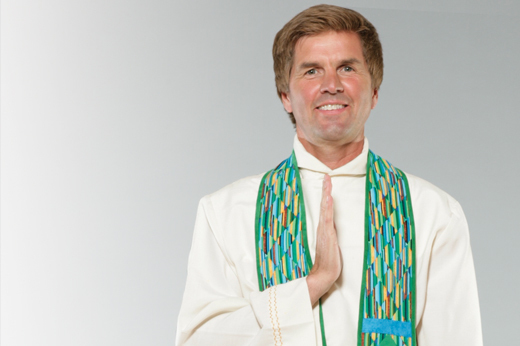To mark Rev. Bruce Sanguin’s 56th birthday last June, he and his wife, Rev. Ann Evans, took the day off and played 18 holes of golf at Vancouver’s Fraserview Golf Course. Sanguin shot a “surprisingly good” 84 from the par-72 tees.
It’s 24 hours later. Sanguin started the day watching Roger Federer beat Mikhail Kukushkin in straight sets at the world’s oldest tennis tournament, Wimbledon. As Sanguin guides me through the sunny courtyard of Canadian Memorial United, he marvels at the passion Federer brings to his game after almost a decade at the top of the tennis world.
“How can Federer still be so intense?” he asks. “How can he maintain it at that level?”
The question intrigues Bruce Sanguin, perhaps because he could just as easily ask it of himself. In the past five years, he has written four widely acclaimed books and co-authored a fifth, published innumerable articles, ministered a cutting-edge United Church congregation and maintained a speaking and workshop schedule that leaves you jet-lagged just reading it. His idea that everything in the universe — including humans, including religious faith — is unfolding as part of a sacred, evolutionary process has attracted the attention of leading theological thinkers and church leaders who see it as a timely reconciliation of religion, mysticism and science.
“Bruce helps us understand our ancient faith in remarkably fresh ways,” remarks the United Church’s moderator, Mardi Tindal. “He is helping the church to renovate the house of faith, stripping away peeling paint to help us see timeless beauty, and helping us to restore the language of our faith to its original lustre.”
It’s hard to think of a United Church minister who has a higher profile these days than Bruce Sanguin. In his comfortable office at Canadian Memorial, he admits that the 60- and 70-hour weeks, the travel and the publishing deadlines are taxing — the balm of hot yoga notwithstanding. But like Roger Federer, he doesn’t know how to play his game at any level other than the highest. “I’m kind of an all-or-nothing guy,” he says.
The second oldest of Gord and Betty Sanguin’s six children is a double boomer. Sanguin was born in 1955, at the peak of the postwar baby boom. He is also a child of the western Canadian oil boom. His father worked on oil rigs in Saskatchewan and Alberta from 1953 to ’58, the family living in a trailer and moving from well to well until Bruce was three. The money was good, but the life was hard, especially for Betty, who was tending four young kids. Eventually, “I couldn’t live that nomadic life anymore,” Betty says. So Gord quit the rigs and took up teaching. The Sanguins moved to Winnipeg in 1959, where Bruce’s father completed his education degree and taught junior high school. The senior Sanguins and two of Bruce’s sisters still live there. But Bruce confesses to a lifelong restlessness. “I guess that itinerant thing is in my blood,” he says.
Certainly the books he’s authored, such as Darwin, Divinity and the Dance of the Cosmos; If Darwin Prayed; and The Emerging Church, evoke a mind in constant motion. And it’s not always easy to keep up with him. Even his mother admits to being stymied on occasion. “It can be a little heavyweight,” she says. Yet she’s the first to point out that while her son has always been conscientious, he hasn’t always been cerebral. That’s fairly recent. The young Bruce Sanguin saved his best for sports.
“I grew up a jock,” he says, “played every sport imaginable at a pretty high level.” As a student at Winnipeg’s Churchill High School in the late 1960s and early ’70s, he starred on the football, basketball, volleyball and baseball teams. He says his eventual decision to enrol at the University of Winnipeg had more to do with playing sports than studying psychology, his major.
While all her kids were into sports, Betty Sanguin says Bruce was the one who was clearly driven. “He went at the game like it was life and death,” she says. “He had this incredible determination to be the best.”
It wasn’t until near the end of his undergraduate career that Sanguin began to channel some of that determination into his studies. “Academically, I got by,” he says. “Then in fourth year, I found a Hindu prof who was teaching things like transcendental meditation, and I lit up. That course was my intellectual awakening. Suddenly I started getting As.”
The spiritual side likely had always been there, inherited from his parents. Doing right unto others was a Sanguin family tradition. “My father was constantly bringing home stray kids to meet us,” he says. “Everybody was welcome.” When Sanguin was 14, he discovered that one of his teammates on the Churchill High basketball team had run away from his foster family. It was mid-winter, so Sanguin brought him home and asked if he could stay. “When my father got home, we talked about it, and David moved in and stayed. He became a brother to all of us.” u
The Sanguins were also churchgoers, attending Rosedale United (now Churchill Park United). In the 1970s, his mother got involved in the born-again movement and became a follower of Canadian Anglican evangelist Marney Patterson. In 1977, Sanguin attended a Patterson event with his mother and left a convert.
“It was a time when my soul was hungry for God, for Spirit,” he says. “I had never taken the Gospels seriously, but [Patterson] said Jesus Christ was the way to choose new life. I just swallowed it, hook, line and sinker, and went pretty deep into it.”
Sanguin still had evangelical leanings when he arrived at Emmanuel College in Toronto in 1979 to begin a master of divinity degree. Rev. Steven Chambers, now minister at Shaughnessy Heights United in Vancouver, struck up a friendship with him almost immediately. It was clear to Chambers and others that Sanguin was struggling to be an evangelical in a largely liberal milieu. “There was a lot at Emmanuel that was painful for him. He was encountering things that were a real challenge to where he was coming from.”
As Sanguin was immersing himself in his studies, at home he was juggling a marriage and a two-year-old daughter, Sarah. “We didn’t have any money, so I’d go to school during the day, then work as a waiter. I’d get home and then be up most of the night with the baby and school work.” Sanguin and his first wife later divorced. Today, Sarah is a musician and actor living in Los Angeles.
Ann Evans first met Sanguin at Emmanuel, where she was one of his professors. They married in 1987, a second marriage for both. In the mid-1960s, Evans had been a cause célèbre in The United Church of Canada — the first married woman to be ordained as a minister and settled in a pulpit while raising children. Today she works as a marriage and family therapist in Vancouver. Evans laughs fondly as she remembers a dishevelled Sanguin coming to class, “half asleep with his shoes untied,” who submitted his essays handwritten while everyone else typed them up.
True to form, Sanguin was a late bloomer at Emmanuel. Former moderator Very Rev. Bruce McLeod taught him preaching. “He was the opposite of flamboyant,” McLeod recalls, “quiet and laid-back, not noticeably a star in the making, either in his own or others’ eyes.”
It took three years at Emmanuel for Sanguin to kick into academic overdrive. “I eventually realized that they gave out money for good grades,” he says. “I got pretty interested at that point.”
Sanguin’s books are a complex skein of cosmology, evolutionary theory, biblical analysis, mysticism and whimsy. A one-on-one conversation with him arcs from the commonplace to the transcendent and back again. He speaks well and listens better.
Bruce Sanguin today is a long way from the conflicted evangelical who showed up at Emmanuel College in 1979. But he’s also a long way from mainstream United Church theology. He’s very much his own thinker.
He credits the writing of American mathematical physicist and cosmologist Brian Swimme with switching on the light that changed him. During a silent retreat in Rhode Island 20 years ago, he picked up a copy of The Universe Is a Green Dragon, where Swimme argues that after 13.7 billion years, the universe has become conscious of itself through human beings.
“By the end of the book, I had undergone a mystical transformation,” Sanguin says. “I realized I am not separate from the processes that created me. . . . I am the presence of the universe after 13.7 billion years.”
Sanguin took that idea and ran with it like a baseball player stretching a single into a double, or a volleyball player diving to keep a rally alive. “He started reading faster than I could keep up with, and at a level I didn’t understand,” says Evans. He’s been running flat out ever since.
Pursuing evolutionary spirituality “leads to a place of profound awe and wonder,” Sanguin says. “And deep kinship. You realize that in an evolutionary perspective, you are biologically and spiritually connected with everything. . . . You are the presence of this sacred evolutionary impulse wanting to bring forth a new world.”
And what does this have to do with Christianity? Everything, argues Sanguin. “We each have this incredible responsibility for co-creating. . . . To step into that is to step into the spirit of Jesus of Nazareth, who was willing to read from Isaiah that ‘the Spirit of the Lord is upon me,’ then roll it back up and say, ‘In your hearing, the Scripture has been fulfilled.’ In other words: You’re it, and if you want to know what it looks like, here it is, here we are.”
As intriguing as this may be, and for all the passion Sanguin brings to it, this spin on Christian faith doesn’t resonate with every congregation, and his time in United Church pulpits hasn’t always been easy. Canadian Memorial United has proven to be a unique and happy fit. By granting Sanguin extended study leave so he can write books and attend to far-flung speaking engagements, the congregation is saying that after 15 years together, Sanguin’s ministry is its ministry, too.
More books are indeed in the works. Among other things, Sanguin feels he can do a better job of making evolutionary Christian mysticism accessible to more people. But he also has to face the reality of time: he’s closer now to 60 than 50, and like an aging athlete, he wonders how much longer he can push himself. Those who know him suspect he’ll stay in the game for as long as his legs will carry him — whether that means retreating with Evans to meditate in a beach shack on Australia’s Indian Ocean coast, or lecturing in increasingly high-profile arenas such as the Chautauqua Institution in New York state.
“Bruce has this ability to pour himself into things,” says Rev. Darlene Bamford, a family counsellor in Ottawa. She and Sanguin have been friends since they were in seminary together. “He’s searching for truth, but I don’t think he’ll ever settle for a truth.”
This story originally appeared in the issue of The Observer with the title, “‘An all-or-nothing guy’”















